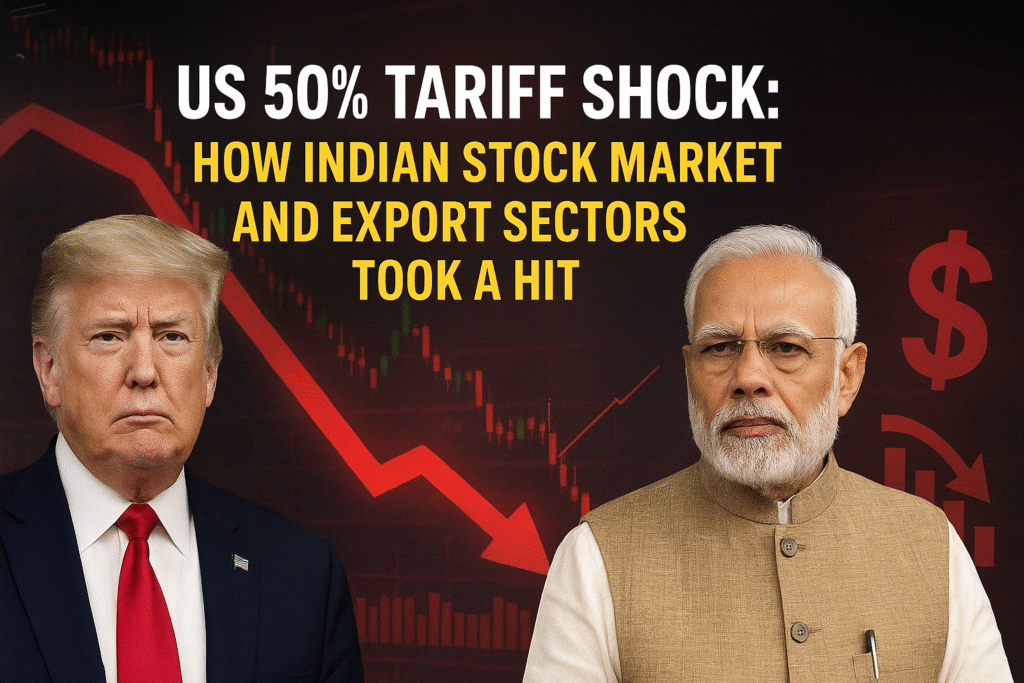
📉 Market Reaction: Immediate Downtrend
The Indian stock market recently experienced a sharp negative trend after the United States announced a 50% tariff on Indian exports, primarily targeting sectors involved in India’s ongoing Russian oil imports. This unprecedented tariff has created immediate turbulence in both the stock market and export-driven industries, highlighting the interconnectedness of global trade and financial markets.
Following the announcement:
Nifty 50 and Sensex dropped by 0.6–0.9%, reflecting widespread investor caution.
All major sectors witnessed negative momentum, particularly export-dependent companies.
Foreign Institutional Investors (FII) pulled out substantial funds, leading to lower market liquidity and increased volatility.
The overall sentiment among retail and institutional investors became cautious, resulting in short-term profit booking and reduced trading volumes.
🏭 Sector-Wise Impact
Textiles High Export costs increased significantly, reducing India’s competitiveness in US markets.
Gems & Jewellery High Higher tariffs discourage American buyers, potentially shifting demand to other countries.
Leather & Footwear High Export demand likely to decline as products become more expensive in the US.
Chemicals & Pharmaceuticals Medium Certain specialty chemicals and pharmaceuticals are now costlier for US importers.
Seafood & Agriculture Medium Reduced demand due to higher US tariffs, affecting exporters’ revenue.
These sectors are particularly sensitive to trade policies and global tariff decisions. Companies in these industries may face declining profit margins in the short term.
🌐 Macro and Indirect Effects
Currency Pressure: The Indian rupee may face depreciation against the US dollar due to reduced foreign inflows from exports.
Inflationary Impact: Higher costs on export materials and intermediate goods can indirectly increase domestic prices.
Investor Confidence: Uncertainty caused by the tariff announcement has reduced market confidence, leading to cautious trading behavior.
Political and Diplomatic Strain: India-US trade relations are now under scrutiny, which may affect long-term strategic investments.
💡 Investor Strategies During Tariff Shocks
- Focus on Defensive Sectors: FMCG, pharmaceuticals, and domestic demand-driven industries remain safer bets.
- Diversify Portfolio: Reduce reliance on export-heavy stocks to manage risk.
- Fundamentals Matter: Long-term investors should prioritize companies with strong balance sheets and stable growth trajectories.
- Track FII/DII Movements: Understanding foreign and domestic investor flows helps gauge market sentiment.
- Short-Term Opportunities: Market corrections can create buying opportunities for fundamentally strong companies at lower valuations.
Additionally, keeping an eye on government measures to counteract tariff impacts, such as incentives or subsidies for affected exporters, can help investors make informed decisions.
The 50% US tariff has caused noticeable pressure on Indian stock markets and export-oriented sectors. While short-term volatility is inevitable, investors who adopt a long-term, fundamentals-based approach, diversify wisely, and focus on defensive sectors are better positioned to navigate this challenging scenario.
- By understanding both sector-specific impacts and macro-level implications, investors can make strategic decisions that balance risk and reward in a rapidly changing global trade environment.

